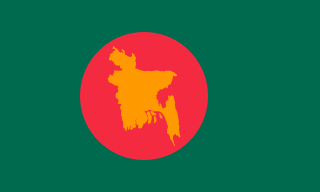
The Bangla Academy is the official regulatory body of the Bengali language in Bangladesh. It is an autonomous institution funded by the Government of Bangladesh that fosters the Bengali language, literature and culture, works to develop and implement national language policy and conducts original research in Bengali. Established in 1955, it is located in the Burdwan House in Shahbagh, Dhaka, within the grounds of the University of Dhaka and Suhrawardy Udyan. The Bangla Academy hosts the annual Ekushey Book Fair.

Manikganj is a district in central Bangladesh and part of the Dhaka Division. Established in 1845, it was originally a subdivision of Faridpur District. In 1956, it was included in Dhaka District for administrative purposes. In 1984, Manikganj was declared a full district.

Martyred Intellectuals Memorial is a monument built in memory of the martyred intellectuals of the Bangladesh Liberation War. The memorial is located at Rayerbazar, Mohammadpur Thana in Dhaka. The memorial was designed by architect Farid U Ahmed and Jami Al Shafi. The initial proposal for a memorial at Rayer Bazar was brought forward by Projonmo 71, who also laid a temporary foundation stone in 1991.

The High Court Division, Supreme Court of Bangladesh popularly known as the 'High Court' is one of the two divisions of the Supreme Court of Bangladesh, the other division being the Appellate Division. It consists of the Chief Justice of Bangladesh and the Judges of the High Court Division.
1971 (MCMLXXI) was a common year starting on Friday of the Gregorian calendar, the 1971st year of the Common Era (CE) and Anno Domini (AD) designations, the 971st year of the 2nd millennium, the 71st year of the 20th century, and the 2nd year of the 1970s decade.

The Independence Day of Bangladesh is celebrated on 26 March as a national holiday in Bangladesh. It commemorates the country's declaration of independence from Pakistan in the early hours of March 26, 1971.

1971 Dhaka University massacre refers to the massacre of students and faculty at the University of Dhaka in East Pakistan by the Pakistan Army, at the beginning of what would become the Bangladesh Liberation War. In March 1971, the Pakistan Army Eastern Wing Commander Tikka Khan launched Operation Searchlight on the orders of dictator Yahya Khan to crush the Bengali nationalist movement. As part of the operation, the army launched an assault on the university campus. It is the deadliest university attack in history.

Mohammed Fazle Rabbee was a renowned cardiologist and a published medical researcher. He was the joint professor of Cardiology and Internal Medicine at Dhaka Medical College and Hospital. He was noted for his progressive thinking and unconventional beliefs for a modern Bengali society. He was murdered in the intellectual killing during the 1971 genocide in Bangladesh by Pakistani army and its local collaborators, the Jamaat-affiliated Al-Badr militia.

Martyred Intellectuals Day is observed on 14 December in Bangladesh to commemorate the large number of Bangladeshi intellectuals killed by Pakistani forces and their collaborators during the Bangladesh Liberation War, particularly on 25 March and 14 December 1971. The killings were undertaken with the goal of annihilating the intellectual class of what was then East Pakistan. Two days after the events of 14 December on 16 December, Bangladesh became independent through the surrender of Pakistani forces.
Ashrafuz Zaman Khan is a Pakistani Bengali American who is one of the convicted masterminds of 1971 killing of Bengali intellectuals. In 1971, he was a member of the Central Committee of the Islami Chhatra Sangha. After liberation he went to Pakistan and worked for Radio Pakistan. Later, he moved to New York and presently heads the Queens branch of Islamic Circle of North America (ICNA). He was sentenced to death in absentia by the International War Crimes Tribunal for killing 18 Bengali intellectuals during the last days of the 1971 Liberation War of Bangladesh.

Syed Nazmul Haque, born in the district of Khulna, was a martyred Bengali journalist.

ANM Faizul Mahi, born in the district of Feni, was a Bengali educationist.

Mohammad Martuza was a Bengali physician, who was killed during the 1971 liberation war of Bangladesh. He is considered a martyr in Bangladesh.
ANM Golam Mostafa, was a martyred Bengali journalist.
The non-cooperation movement of 1971 was a historical movement in then East Pakistan by the Awami League and the general public against the military government of Pakistan in March of that year. After the announcement of the suspension of the session of the National Assembly of Pakistan on 1 March, the spontaneous movement of the people started, but officially on the call of Sheikh Mujibur Rahman, the non-cooperation movement started on 2 March and continued until 25 March. The movement lasted for a total of 25 days.













